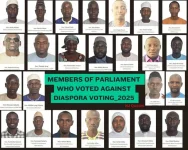Many countries let their citizens vote from abroad, despite what 25 Gambian lawmakers claimed when they blocked diaspora voting rights. The Justice Minister and Election Commission backed these lawmakers, yet diaspora voting happens worldwide. Numerous nations actually save parliament seats for people living overseas. Setting up these diaspora seats requires simple planning, not complicated science.
Look at Cape Verde—they give six parliament spots to citizens abroad, with two representatives each from the Americas, Africa, and Europe. Ecuador follows a similar pattern, with six seats split between global regions. Ivory Coast wrote diaspora participation directly into its constitution under Articles 30 and 87. Lebanon passed an electoral law in 2017 that reserves six parliamentary seats for citizens living outside the country.
Moldova allocates six parliament seats to their diaspora and created 14 special voting districts for overseas citizens during their 2019 elections. Niger offers five parliament spots with one representative per continent. Senegal stands out by dedicating 15 of their 165 parliamentary seats to Senegalese living abroad through eight overseas voting districts across multiple continents.
Tunisia takes a different approach by making diaspora representation proportional to population size. Their 2014 electoral law grants Tunisians abroad the right to become representatives and allows dual citizens to run for president. These examples show how common this practice has become across different regions and political systems.
Gambian opposition leaders demanded electoral reforms back in 2015, listing diaspora voting rights as their priority. They argued strongly that Gambians abroad deserve voting rights as a fundamental constitutional guarantee. Yet ten years later, the government, legislature, political parties and election commission still fail to make this basic right available.
The real problem dates back beyond 2017 or 1994 - it stretches all the way to 1965. Our leaders and officials never took their responsibilities seriously as required by law and their positions. Otherwise, how could diaspora voting remain unsolved? Countries just as poor as The Gambia - like Guinea Bissau, Mali, Mauritania, and Guinea Conakry - manage to let their overseas citizens vote without major problems.
This slow, careless attitude affects every part of Gambian society. Officials waste time and money through endless delays and halfhearted efforts. When they finish basic infrastructure projects like roads, hospitals, classrooms, or power stations, they celebrate extravagantly as though these represent extraordinary achievements rather than basic government functions.
Look at Cape Verde—they give six parliament spots to citizens abroad, with two representatives each from the Americas, Africa, and Europe. Ecuador follows a similar pattern, with six seats split between global regions. Ivory Coast wrote diaspora participation directly into its constitution under Articles 30 and 87. Lebanon passed an electoral law in 2017 that reserves six parliamentary seats for citizens living outside the country.
Moldova allocates six parliament seats to their diaspora and created 14 special voting districts for overseas citizens during their 2019 elections. Niger offers five parliament spots with one representative per continent. Senegal stands out by dedicating 15 of their 165 parliamentary seats to Senegalese living abroad through eight overseas voting districts across multiple continents.
Tunisia takes a different approach by making diaspora representation proportional to population size. Their 2014 electoral law grants Tunisians abroad the right to become representatives and allows dual citizens to run for president. These examples show how common this practice has become across different regions and political systems.
Gambian opposition leaders demanded electoral reforms back in 2015, listing diaspora voting rights as their priority. They argued strongly that Gambians abroad deserve voting rights as a fundamental constitutional guarantee. Yet ten years later, the government, legislature, political parties and election commission still fail to make this basic right available.
The real problem dates back beyond 2017 or 1994 - it stretches all the way to 1965. Our leaders and officials never took their responsibilities seriously as required by law and their positions. Otherwise, how could diaspora voting remain unsolved? Countries just as poor as The Gambia - like Guinea Bissau, Mali, Mauritania, and Guinea Conakry - manage to let their overseas citizens vote without major problems.
This slow, careless attitude affects every part of Gambian society. Officials waste time and money through endless delays and halfhearted efforts. When they finish basic infrastructure projects like roads, hospitals, classrooms, or power stations, they celebrate extravagantly as though these represent extraordinary achievements rather than basic government functions.












